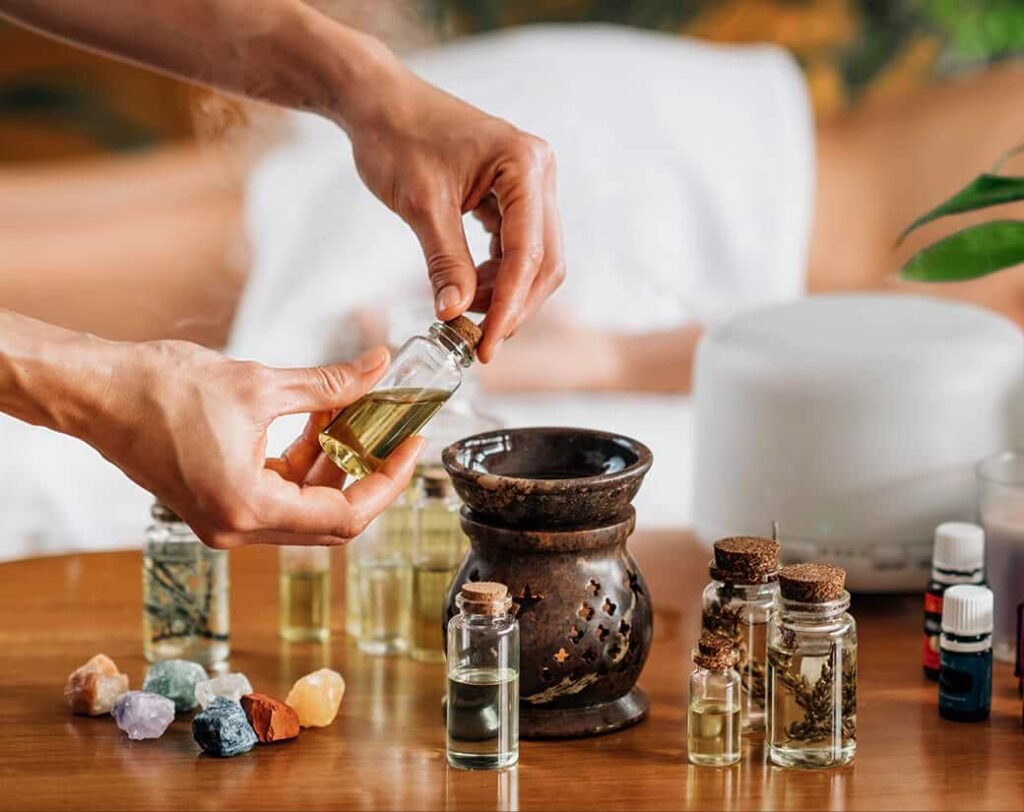In today’s fast-paced world, insomnia and anxiety have become increasingly common issues affecting millions of people worldwide. As more individuals seek natural remedies for these conditions, aromatherapy has emerged as a popular and effective alternative. Aromatherapy, the practice of using essential oils extracted from plants for therapeutic purposes, has been praised for its calming and restorative effects. This article explores the role of aromatherapy in managing insomnia and anxiety, highlighting its benefits, methods of use, and the science behind its effectiveness.
Understanding Insomnia and Anxiety

Before delving into aromatherapy, it is essential to understand the conditions it aims to alleviate.
- Insomnia is characterized by difficulty falling or staying asleep, leading to fatigue, irritability, and a decline in overall health and productivity. Chronic insomnia can result in long-term health problems such as heart disease, diabetes, and depression.
- Anxiety manifests as excessive worry, fear, or unease. It can interfere with daily life and often coexists with insomnia, creating a vicious cycle where one condition exacerbates the other.
Traditional treatments for these issues include medication and therapy. While effective, these options may not work for everyone and often come with side effects. Aromatherapy offers a natural and holistic approach to relief.
The Science Behind Aromatherapy
Aromatherapy works by stimulating the olfactory system—the part of the brain connected to smell—which directly influences the limbic system. The limbic system is responsible for emotions, memory, and stress responses. When essential oils are inhaled or absorbed through the skin, they interact with the brain’s chemical receptors, promoting relaxation and reducing stress levels.
Scientific studies have shown that certain essential oils can lower cortisol levels (the stress hormone) and increase the production of serotonin and dopamine, which are associated with feelings of happiness and relaxation. These effects make aromatherapy a powerful tool for managing both insomnia and anxiety.
Essential Oils for Insomnia and Anxiety

Different essential oils are known for their unique properties. Below are some of the most effective oils for managing insomnia and anxiety:
- Lavender Oil Lavender is one of the most well-known and widely used essential oils for relaxation and sleep. Its calming properties help reduce anxiety levels and promote deep, restorative sleep.
- Chamomile Oil Chamomile has a soothing effect on the mind and body, making it an excellent choice for reducing stress and inducing sleep.
- Bergamot Oil Known for its citrusy aroma, bergamot oil is effective in alleviating stress and improving mood. It is particularly useful for reducing symptoms of mild anxiety.
- Ylang-Ylang Oil This sweet-smelling oil helps calm the nervous system and lowers heart rate, making it beneficial for both anxiety and insomnia.
- Cedarwood Oil Cedarwood has grounding properties that can help ease tension and promote a sense of calmness, aiding in better sleep.
- Frankincense Oil Frankincense is known for its ability to slow down breathing and promote a sense of tranquility, making it ideal for meditation and relaxation.
How to Use Aromatherapy for Insomnia and Anxiety
There are several ways to incorporate aromatherapy into your daily routine. Here are some of the most effective methods:
- Diffusers Using an essential oil diffuser is one of the easiest and most effective ways to enjoy aromatherapy. Simply add a few drops of your chosen oil to the diffuser and let the calming aroma fill your space.
- Topical Application Essential oils can be diluted with carrier oils like coconut or almond oil and applied directly to the skin. Popular application points include the wrists, temples, and behind the ears.
- Aromatherapy Baths Adding a few drops of essential oil to a warm bath can create a relaxing experience that soothes both the mind and body.
- Inhalation Place a few drops of essential oil on a tissue or cotton ball and inhale deeply. This method is especially useful for quick stress relief.
- Pillow Sprays Spraying a lavender-infused mist on your pillow before bedtime can help you fall asleep faster and enjoy a more restful night.
- Massage Therapy Combining aromatherapy with massage can enhance relaxation and provide relief from muscle tension and stress.
Benefits of Aromatherapy for Insomnia and Anxiety

The use of aromatherapy offers numerous benefits, including:
- Non-Invasive and Natural Aromatherapy is a holistic approach that uses natural plant extracts, making it a safer alternative to medications.
- Reduces Stress Levels The calming properties of essential oils help lower stress and anxiety levels, promoting a sense of well-being.
- Improves Sleep Quality Aromatherapy can help regulate sleep patterns, making it easier to fall asleep and stay asleep throughout the night.
- Enhances Mood Many essential oils have mood-enhancing properties that can uplift your spirits and reduce feelings of sadness or worry.
- Promotes Relaxation Regular use of aromatherapy encourages relaxation, helping you manage daily stress more effectively.
Precautions and Considerations
While aromatherapy is generally safe, it is essential to use it correctly to avoid adverse effects:
- Dilution: Essential oils should always be diluted with a carrier oil before applying to the skin to prevent irritation.
- Quality Matters: Use high-quality, pure essential oils from reputable sources to ensure safety and effectiveness.
- Allergic Reactions: Conduct a patch test before using a new essential oil to check for allergies.
- Consultation: If you are pregnant, nursing, or have a medical condition, consult a healthcare professional before using essential oils.
Conclusion
Aromatherapy is a powerful and natural method for managing insomnia and anxiety. By leveraging the calming and restorative properties of essential oils, individuals can achieve better sleep and reduce stress levels, improving their overall quality of life. Whether you choose to diffuse lavender oil at bedtime or enjoy a chamomile-infused bath after a long day, aromatherapy offers a versatile and effective solution for these common issues. However, it is essential to use essential oils responsibly and consult a professional when necessary to maximize their benefits safely. Embrace the power of aromatherapy and take a step toward a calmer, more restful life.

